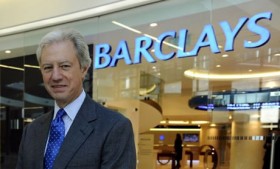 Barclays chairman Marcus Agius has confirmed his resignation, as the bank promises a “root and branch review” following the inter-bank lending rate-fixing scandal.
Barclays chairman Marcus Agius has confirmed his resignation, as the bank promises a “root and branch review” following the inter-bank lending rate-fixing scandal.
Last week Barclays was fined £290m ($450m) for attempting to manipulate the Libor inter-bank lending rate. Barclays’ chief executive Bob Diamond will appear before MPs on the Treasury Committee on Wednesday. Mr Agius is due to answer their questions on Thursday.
Barclays said Mr Agius would remain in his post until “an orderly succession is assured”. Mr Agius said the findings had “dealt a devastating blow” to Barclays’ reputation.
As a result Barclays’ board has launched an audit of its business practices, which will be conducted by an independent body and report to the new deputy chairman, Sir Michael Rake.
The bank promised:
- a “root and branch review” of its “flawed” past practices
- a public report of the audit’s findings
- a new mandatory code of conduct for all staff
Barclays will establish a “zero tolerance policy” to anything that damages its reputation, the bank said in the statement.
Sir Michael Rake, BT chairman and senior independent director at Barclays, has been appointed deputy chairman at the bank. He is seen as a likely successor to Mr Agius.
Sir John Sunderland, a non-executive director of Barclays, will begin the search for a new chairman from Monday.
Libor scandal
The leader of the opposition, Ed Miliband underlined the importance of “restoring trust” in British banks. “I really don’t think that can be done by [Chief executive] Bob Diamond,” he said.
Mr Miliband called for a full public inquiry into the banking industry and the introduction of a new professional code for bankers.
The Labour leader also called for criminal charges to be brought against those involved in the rate-fixing scandal.
Barclays was fined after the Financial Services Authority (FSA) found its traders had lied about the interest rate other banks were charging it for loans. Investigations are also under way at RBS, HSBC, Citigroup and UBS.
Giving a lower reading than the true rate would give the impression that Barclays was considered a better lending risk than it actually was.
Reporting a higher reading than the real rate could have inflated trading profits artificially, misleading investors and regulators.
Libor (London Inter Bank Offered Rate) is the rate at which banks in London lend money to each other.
Bob Diamond said Mr Agius’s decision “deserves all of our respect” and paid tribute to Mr Agius’ six years as chairman: “He has been a thoughtful and supportive colleague to me in all of my roles – especially since I became chief executive last year.”
Mr Agius had failed to stand up to Mr Diamond, who was regarded as very talented but also very headstrong.
Mr Diamond welcomed plans for an independent audit: “I am committed to ensuring that the recommendations from this review are implemented in full.”
He also promised to “continue to build a culture that all of those with a stake in Barclays can be proud of”.
Are you a Barclays customer, shareholder or staff member? What do you think of Mr Agius and his decision to resign? Send us your comments and experiences.
[adrotate banner=”31″]

I really wanted to develop a simple note to be able to appreciate you for all of the fantastic tactics you are giving on this website. My prolonged internet investigation has finally been rewarded with good quality concept to write about with my friends and family. I would mention that we website visitors actually are undeniably blessed to exist in a good place with many special people with insightful strategies. I feel very blessed to have come across your entire site and look forward to really more brilliant minutes reading here. Thank you again for everything.